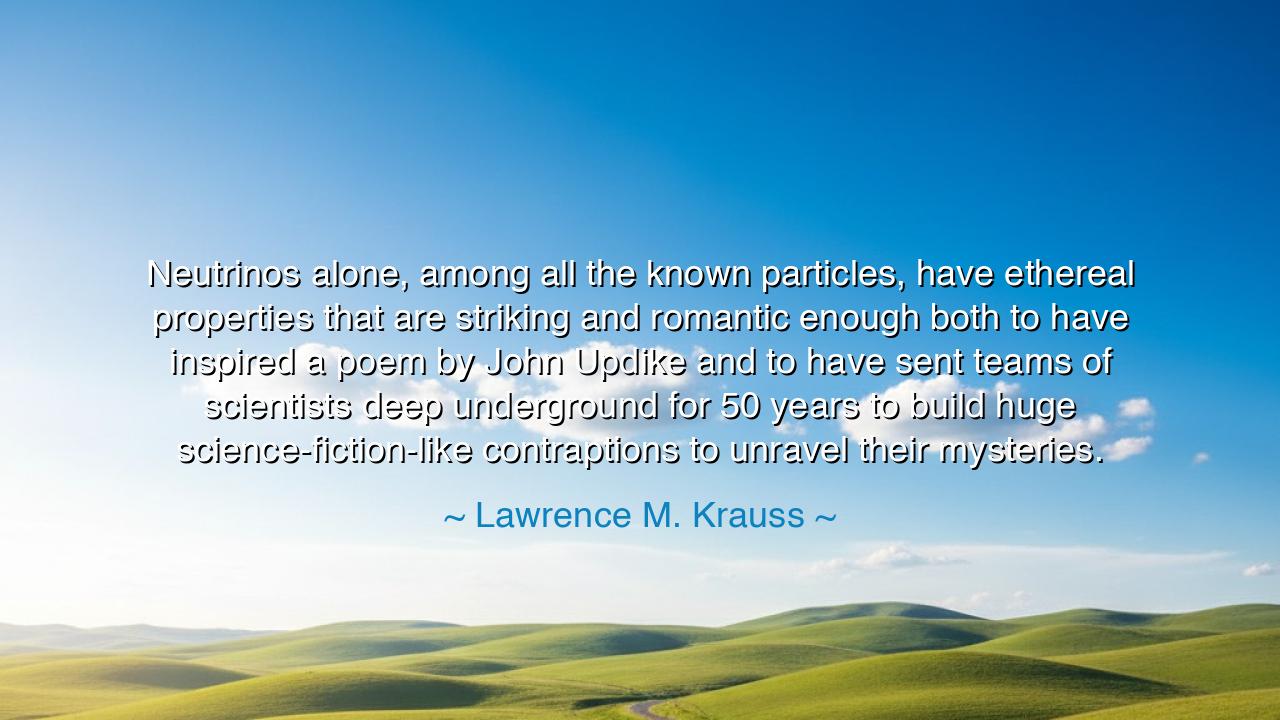
Neutrinos alone, among all the known particles, have ethereal
Neutrinos alone, among all the known particles, have ethereal properties that are striking and romantic enough both to have inspired a poem by John Updike and to have sent teams of scientists deep underground for 50 years to build huge science-fiction-like contraptions to unravel their mysteries.






Gather close, my children, for the words of Lawrence M. Krauss contain a lesson that reaches beyond the limits of mere science and into the very heart of wonder and mystery. He spoke thus: "Neutrinos alone, among all the known particles, have ethereal properties that are striking and romantic enough both to have inspired a poem by John Updike and to have sent teams of scientists deep underground for 50 years to build huge science-fiction-like contraptions to unravel their mysteries." These words, though rooted in the realm of science, reveal to us a truth that stretches back to the ancient past—the quest for understanding that drives the human soul to the farthest reaches of both the cosmos and the heart.
The neutrino, my children, is but a humble particle, so small and light that it passes through the very substance of our world without leaving a trace. It is the ghost of the quantum world, a being that exists without truly being seen, felt, or understood. Yet, despite its elusiveness, the neutrino has captured the imagination of scientists and poets alike. It is not just a scientific enigma, but a symbol—a reminder of the infinite mysteries that lie just beyond our grasp, ever elusive, ever beckoning. So profound is its nature that it inspired the great John Updike to write a poem about it, and so powerful is its pull that it has driven teams of scientists to journey deep beneath the earth, to construct great and complex machines, in an attempt to unlock its secrets.
What is it, my children, that makes the neutrino so romantic? It is not simply the fact that it is elusive, but that it embodies the very essence of the unknown, of the mystery that stirs the soul to action. For in the search for the neutrino, we see not just a scientific endeavor, but a reflection of the human spirit—that which seeks to understand, to uncover the hidden forces that shape the universe. There is something profoundly poetic in the idea that a particle so small, so ethereal, could hold such power over our imagination. It is a reminder that there is always more to discover, that the boundaries of our knowledge are ever expanding, yet we are always drawn forward into the great unknown.
Let us look to the example of Isaac Newton, that great sage who, in the pursuit of knowledge, uncovered the laws of motion and the force of gravity. Though his discoveries seemed to bring the heavens closer to earth, he was ever aware that there was more to the universe than he had yet touched. Even in his great genius, Newton famously said, "I do not know what I may appear to the world, but to myself I seem to have been only like a boy playing on the seashore, and diverting myself in now and then finding a smoother pebble or a prettier shell than ordinary, while the great ocean of truth lay all undiscovered before me." The great Newton, though a giant among men, knew that there was always more to uncover, that the universe was far more vast and mysterious than his mind could fully comprehend. In this, he was a reflection of the very human condition—always seeking, always yearning to know more, to understand more.
The search for the neutrino is but the latest chapter in this ancient pursuit. For 50 years, teams of scientists have worked, not just with machines, but with faith—faith in the idea that the universe holds secrets worth uncovering. They have dug deep into the earth, creating science-fiction-like contraptions—massive detectors—beneath the ground, hoping to capture a glimpse of this elusive particle. And though their efforts have yet to fully unravel the mysteries of the neutrino, their dedication speaks to the deep, unwavering commitment of the human spirit to uncover the truths of existence, no matter how long it takes or how impossible it may seem. This, my children, is the essence of humanity—a pursuit of knowledge that transcends the boundaries of space and time, a search for meaning that drives us forward into the unknown.
So, what then, my children, is the lesson that we must take from the neutrino and the pursuit of its secrets? It is this: never stop searching for the mysteries that lie beyond the veil of the known. Whether it is in the realm of science, the depths of the heart, or the vastness of the spirit, there is always more to learn, more to discover. The neutrino, with its ethereal properties, is a symbol of the beauty of the unknown, and the search for it teaches us that the journey itself is as important as the destination. The human spirit, like the neutrino, is both mysterious and radiant, and it is through our relentless pursuit of knowledge and understanding that we grow closer to the truth of our existence.
Thus, my children, when you are faced with the vastness of the unknown, remember the neutrino and the generations of seekers who have gone before you. Let their dedication inspire you to pursue your own mysteries, whether they be in the world around you, in the people you love, or in the very depths of your own soul. Let the search for truth, for beauty, and for meaning be your guiding star, and know that every question you ask, every answer you seek, brings you closer to the great ocean of truth that lies just beyond the horizon.






AAdministratorAdministrator
Welcome, honored guests. Please leave a comment, we will respond soon